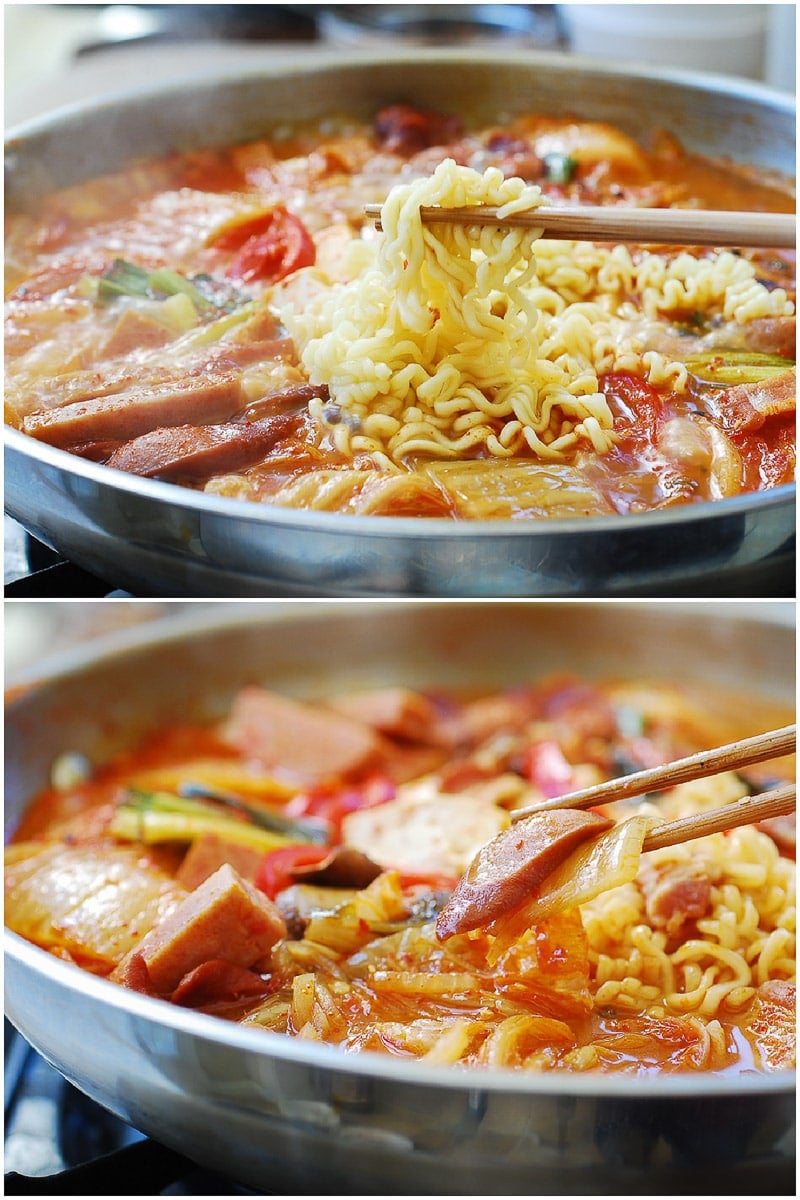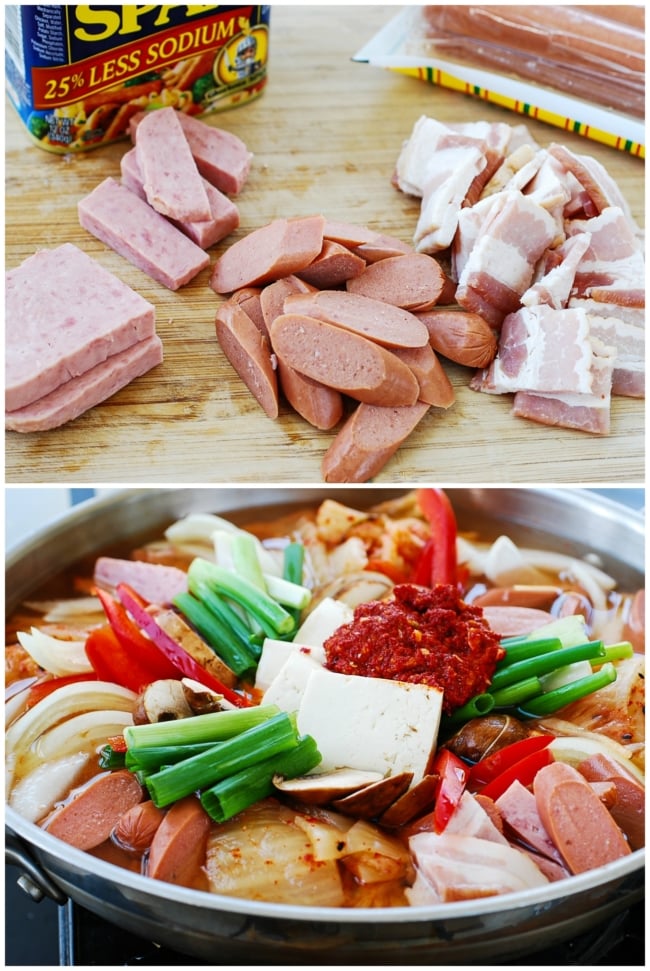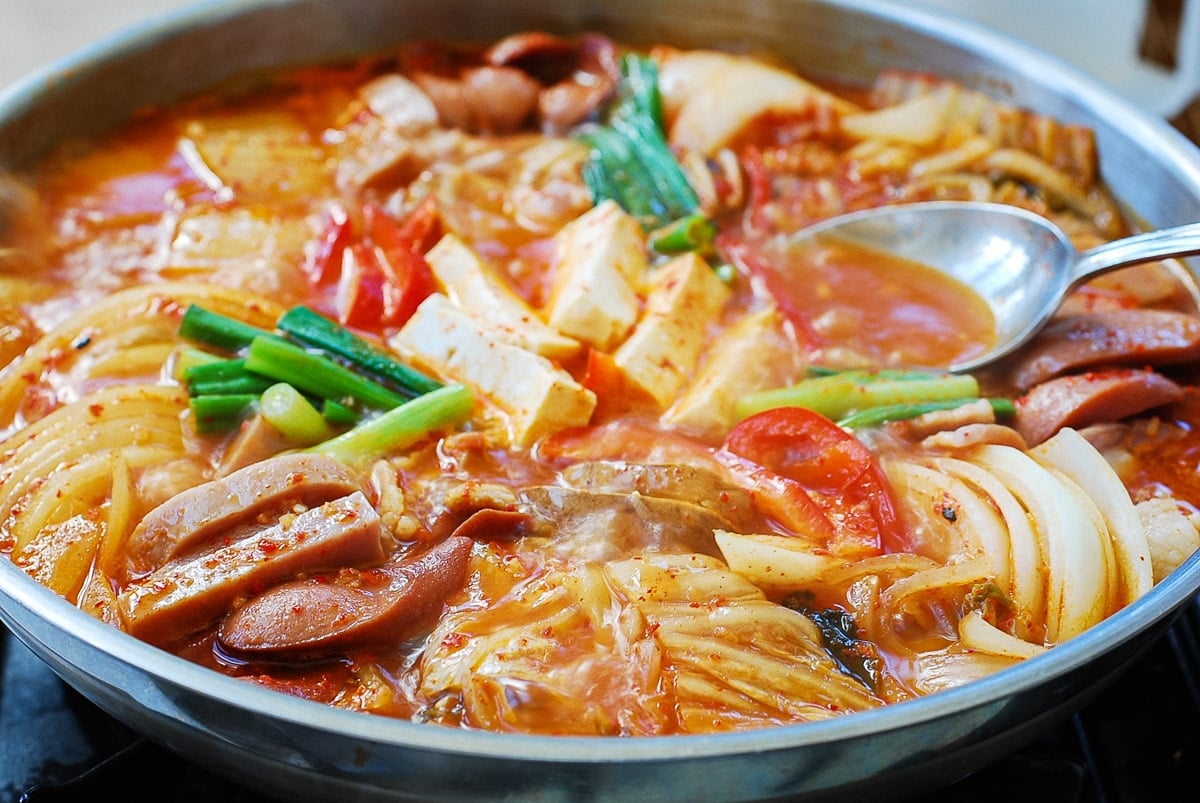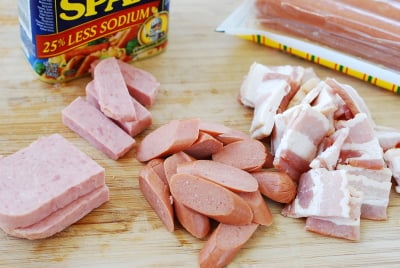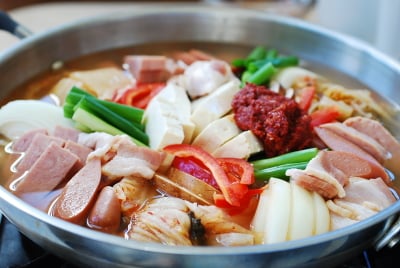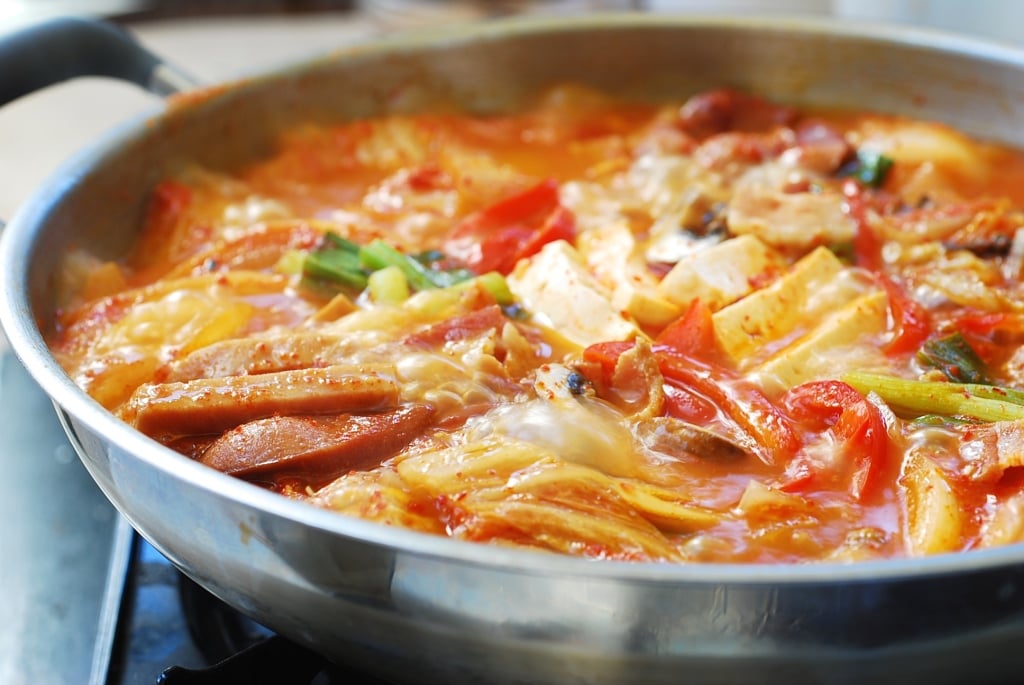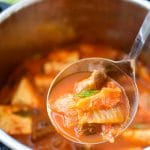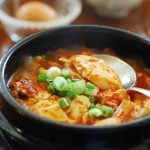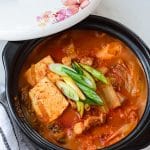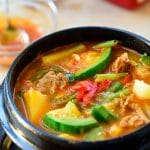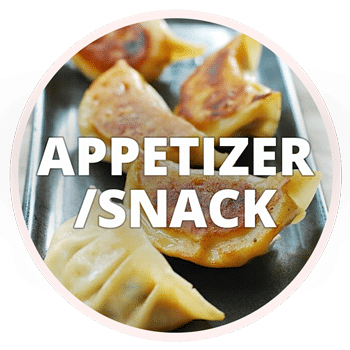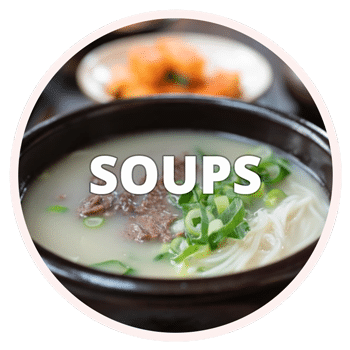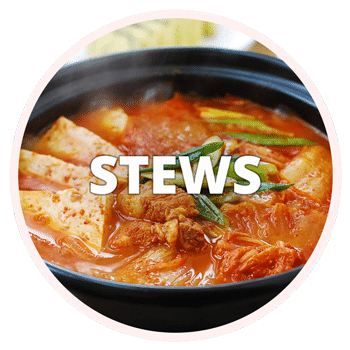Budae jjigae (Army stew) is easy to make. As long as it has kimchi and some American processed meats, it’s a budae jjigae. This budae jjigae recipe will give you a few tips for making it delicious!
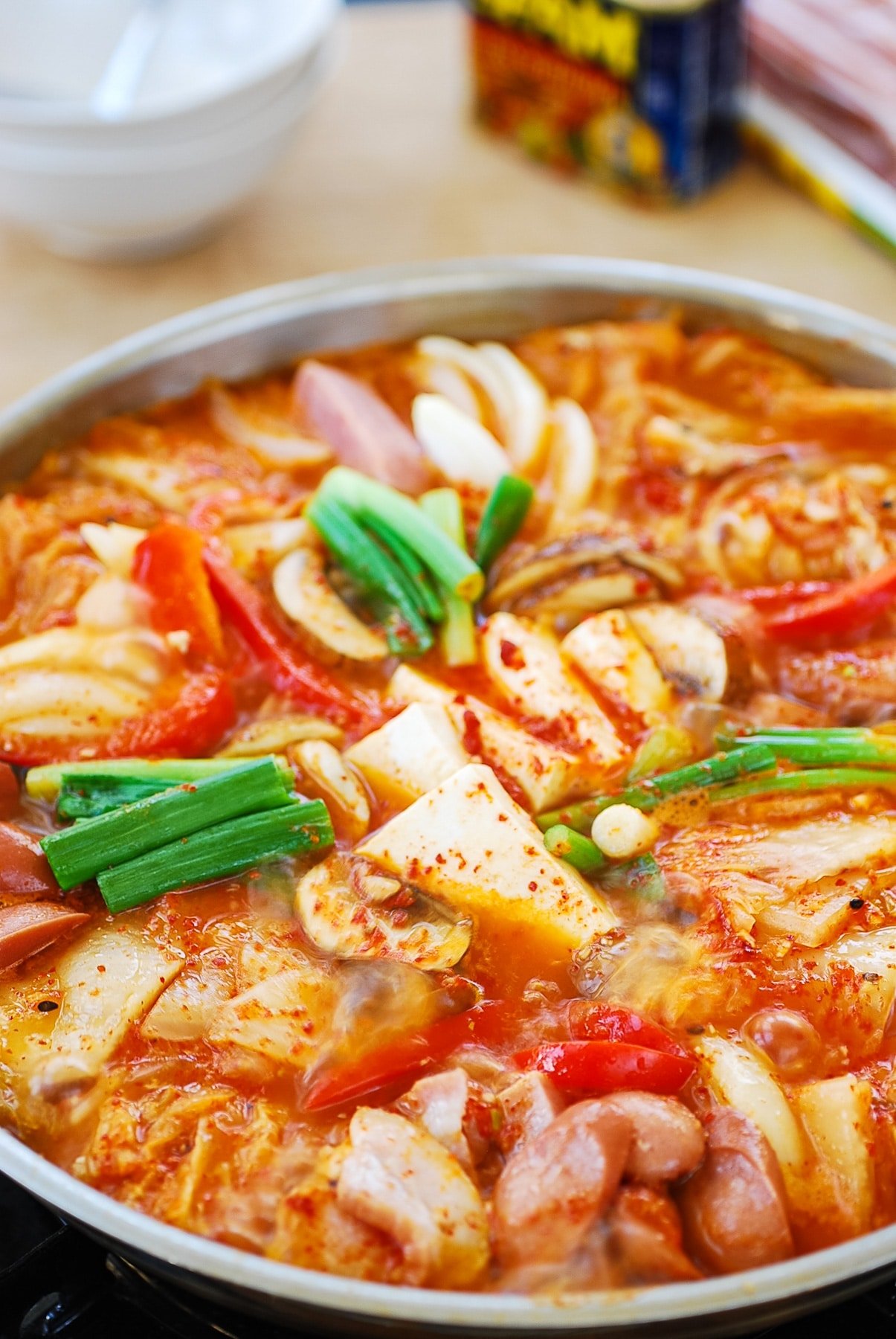
What is budae jjigae?
Budae jjigae (부대찌개) is a fusion dish that incorporates American processed meats such as Spam, ham, bacon, and hot dogs into a Korean stew with kimchi. Budae is a general term for a military base in Korean, but budae jjigae is translated into “Army stew” or “Army base stew” because of its origin.
In the 1950’s, food was extremely scarce after the three-year long Korean war which ended in 1953. So, those surplus processed meats from the U.S. military bases were great sources for Koreans to supplement their food shortage. In the city of Uijeongbu (의정부), about 12 miles northeast of Seoul, where U.S. Army bases are stationed, a restaurant owner started to make a stew with those meats from the Army bases. Since then, budae jjigae has become immensely popular as a delicious comfort food all over Korea.
How to make Korean army stew
As long as it has kimchi and some processed meats, it’s a budae jjigae. You can’t go wrong with the combination of sour kimchi and fatty bacon, spam, ham, and/or hot dogs. The older the kimchi is, the better your stew will taste.
Other popular bugae jjigae ingredients include: slices of American yellow cheese, canned baked beans, instant ramyeon (or ramen) noodles, and rice cake slices.
I kept it simple in this budae jjigae recipe. To make the stew, cut the ingredients into bite size pieces, and arrange them in a medium size shallow pot. Cook after adding the broth and seasoning ingredients.
Tips for making and enjoying budae jjigae
- Use flavorful broth such as anchovy broth or good quality store-bought beef or chicken broth.
- Have extra broth so you can replenish while eating, if needed.
- Noodles absorb lots of liquid if you cook them in the stew. Pre-boil the noodles right before adding to the stew.
- Cook the stew over the portable burner at the table for more delicious experience. You can add more ingredients as the diners take some out to eat. Most ingredients in this recipe don’t take long to cook.
- Eat the noodles first while they are still nicely chewy. This will also prevent the noodles from soaking up too much liquid from the stew.
- Freeze the leftover processed meats for longer storage and more budae jjigae later.
More Korean stew recipes
Kimchi jjigae
Kimchi soondubu jjigae
Haemul jeongol (seafood hot pot)
Doenjang jjigae
Gamjatang (spicy pork bone stew)
For more Korean cooking inspirations, follow along on YouTube, Pinterest, Twitter, Facebook, and Instagram.
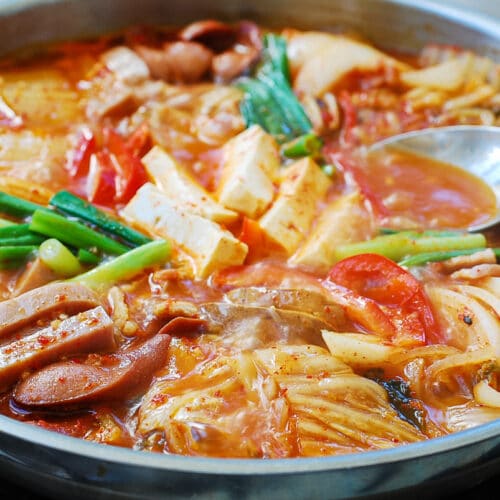
Ingredients
- 2 cups baechu (napa cabbage) kimchi
- 2 hot dogs (or sausages)
- 3 strips bacon (or about 3 ounces fatty pork),
- ⅓ can of spam (about 4 ounces)
- 4 ounces tofu, sliced (about 1/2-inch thick)
- 1/2 medium onion, thinly sliced
- 3 to 4 mushroom caps, sliced
- 2 scallions, cut into 2 inch pieces
- 1/4 red bell pepper, sliced - optional
- 4 cups anchovy broth (or beef or chicken stock) More if you want extra broth. You can also use water.
Seasoning
- 1 tablespoon gochugaru (Korean red chili pepper flakes) Use more for a spicier stew
- 1 teaspoon gochujang (Korean red chili pepper paste)
- 1 tablespoon soup soy sauce (or salt to taste)
- 1 tablespoon minced garlic
- 1 to 2 tablespoons broth or water
- black pepper to taste
Optional
- 1 package instant ramyeon noodles Pre-boil right before adding to the stew to keep them from absorbing too much liquid from the stew
Instructions
- Cook over medium high heat until the bacon is cooked through and the kimchi has softened. Add the optional ramyeon noodles and more broth or water if necessary. (The noodles soak up a lot of the liquid, so I briefly cook the ramyeon noodles in a separate pot of water before adding to the stew.)
Notes
- Use flavorful broth such as anchovy broth or good quality store-bought beef or chicken broth.
- Have extra broth so you can replenish while eating, if needed.
- Noodles absorb lots of liquid if you cook them in the stew. Pre-boil the noodles right before adding to the stew.
- Cook the stew over the portable burner at the table for more delicious experience. You can add more ingredients as the diners take some out to eat. Most ingredients in this recipe don’t take long to cook.
- Eat the noodles first while they are still nicely chewy. This will also prevent the noodles from soaking up too much liquid from the stew.
- Freeze the leftover processed meats for more budae jjigae later.


